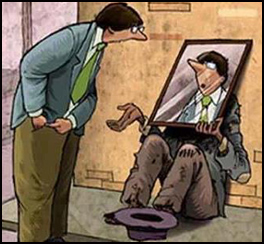
In Richard R. Troxell’s exegesis of Dr. Martin Luther King Jr.’s 1963 book Why We Can’t Wait, he compares today’s “quality of life” laws, which promise the very opposite of quality for people experiencing homelessness, to the discriminatory Jim Crow laws of the past:
These laws created living conditions that were ‘separate but equal.’ These included segregated hospitals and cemeteries. This is startlingly similar to the separate ‘Community Courts’ now targeting people experiencing homelessness across America.
In the old days, restroom facilities for the dominant race and the minority race were separate. But at least there were restrooms. Now, cities don’t want to provide toilet facilities for anyone, no matter what color, if they are homeless.
Richard says:
Also falling into this category, are today’s laws exclusively focused on people experiencing homelessness that include no camping, no soliciting, no sitting, no lying, no loitering, and laws regulating and limiting the feeding of people experiencing homelessness.
A nice middle-aged grandma who lives in a house could do any of these things with impunity. She could erect a tent to wait in line for a big blowout sale, or window-shop all day, or sit on a curb to eat an ice-cream cone, or buy a waffle for somebody else. Each one of these actions is different if a homeless person does it — like putting up a tent; or if someone does it for a homeless person — such as giving away food.
In other words, these are Jim Crow laws because they apply only to a segment of the population. Speaking of laws, here is another quotation from Richard’s piece:
Dr. King contends that there are two types of laws. He sees them as either just or unjust. He says it is our ‘moral responsibility’ to disobey all unjust laws.
It’s easy to see why Dr. King’s ideas make a lot of people uncomfortable. But Richard sees Why We Can’t Wait as an underappreciated treasure that should be read and understood by more people. He also writes:
Dr. King points out that, ‘The struggle for rights is, at the bottom, a struggle for opportunities.’ […] It was generally acknowledged that the lowest paid, and the least stable jobs were earmarked for the ‘Negro.’ Some might say the same is true of today’s ‘African Americans.’ Others would say the impoverished base has simply broadened out and engulfed the weakest.
Both assessments are accurate. Black and white people are both worse off. Equality has taken a strange form. Now, even educated white folks have the opportunity to be unemployed and homeless. This is the unspoken message of many media portrayals, probably because it is what the jargon calls “relatable.”
The subliminal message is, “When horrible misfortune can happen even to educated white folks, it’s time to take things seriously!” The heroes of the civil rights movement and the idealistic radicals of the 60s fought for equality, never dreaming that the equality the future held would look like this. America has 3.5 million minimum-wage workers who are nonetheless homeless, and they have skin of all colors.
Katie Kirkendoll, who goes to school and experiences homelessness in Tennessee, has picked up on the “Homeless is the new black” trope, and written an interesting explanation of why:
As a child growing up in the ’70s I was used to reading headlines ‘Black Man robs drug store’, or ‘John Doe, black, was arrested for’… [T]he days of media targeting black males are on the decline (at least we pray), however now they have decided to target a new group of humans, the homeless.
I looked at one of the local news websites and I found this little headline: ‘Homeless man robs Walgreens, police arrest him before he leaves.’ I ask why does the fact that he is homeless warrant the headline of the story? […] [I]t is a stereotype no different that lumping all African Americans or all Hispanics together in a group to fit stereotypes. It puts those of us who happen to not have a home at this time, to be a part of this stereotyping. This isolates the homeless people (remember we are still people?), from the public: at a time when he or she may need people the most.
I try to get up, dress neatly and put on my makeup, each day. Why do I do this? Because I believe a part of my survival depends on how I appear. Is that what it felt like to ‘pass’? I can’t say, but in many ways that is what I am attempting to do in hope of avoiding danger and promoting a kinder reception when I am in contact with others.
No doubt Ms. Kirkendoll is familiar with another popular saying, one which Richard quotes: “It’s not about white or black, it’s about green.” And no, they’re not talking about the movement that wants to preserve the environment, nothing that exalted. It just means that discrimination is no longer only about race; now more than ever it’s also about money.
Reactions?
Source: “Homeless is the new black,” katiekirkendoll, 10/21/12
Image by BelongingVictoria.com.


